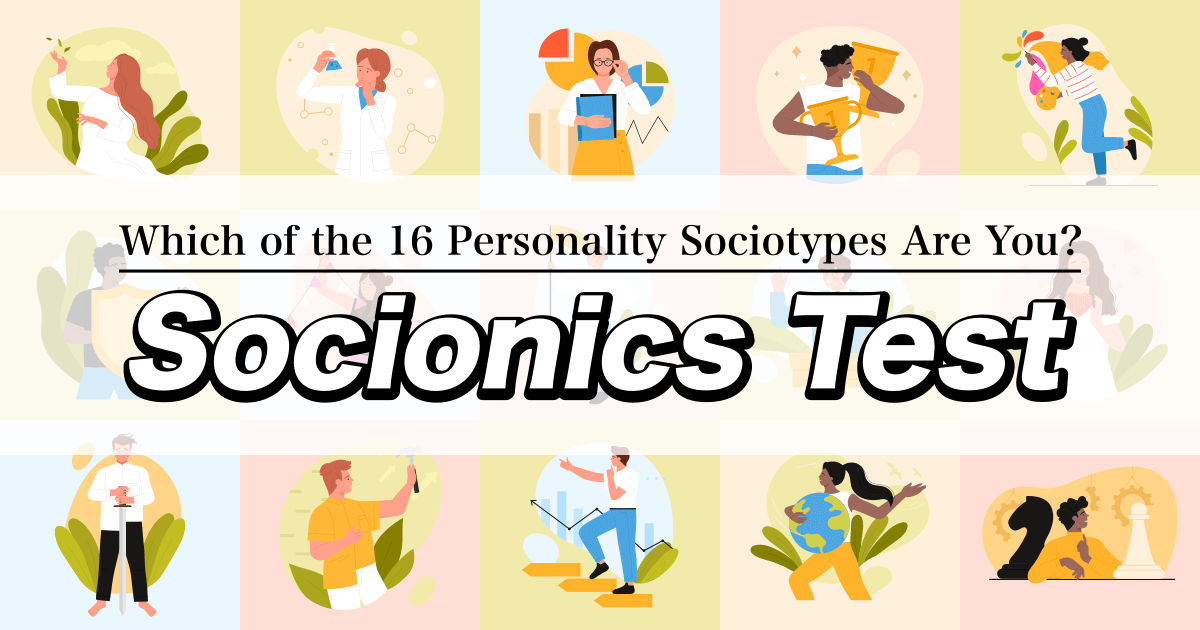
Socionics is a theory of personality classification developed based on Carl Jung's typology and the theory of information metabolism. In Socionics, individuals are categorized into one of 16 distinct types, known as sociotypes. By taking a 40-question test, you can discover which sociotype best represents your personality. So, which type are you?
40questions3minutes
The Socionics Personality Test is based on Socionics, a personality theory that classifies peopleinto sixteen distinct types called sociotypes.By answering forty questions, this test analyzes which sociotype best matches your natural wayof thinking, decision-making, and interacting with others.
Socionics goes beyond simple personality labels.It is designed to explain interpersonal compatibility, communication mismatches,and role distribution in both personal and professional environments.
Socionics is a psychological and typological theory developed in the 1970s by Lithuanian researcherAušra Augustinavičiūtė.It builds on Carl Jung’s theory of psychological types and expands it through the concept ofInformation Metabolism.
In Socionics, personality differences are not treated as character flaws or moods,but as systematic differences in how people receive, process, and prioritize information.
Each sociotype represents a stable pattern of information processing that influences thinking,emotional expression, motivation, and communication style.
Knowing your sociotype can help you better understand yourself and your relationships.
One of the defining features of Socionics is its theory of Intertype Relations.Rather than analyzing individuals in isolation, Socionics focuses on how different sociotypesinteract with one another.
Even when people are intelligent and well-intentioned, differences in information prioritiescan lead to recurring misunderstandings.Socionics explains these patterns structurally, showing where compatibility flows naturallyand where friction tends to arise.
Socionics is often compared to MBTI because both systems describe sixteen personality types.However, their goals and theoretical structures differ in important ways.
MBTI primarily focuses on self-understanding and cognitive preferences.
Socionics includes a formal theory of intertype relationships as a core part of the system.
While MBTI can be applied to relationships, Socionics was designed from the outsetto explain why specific type combinations interact the way they do.
Although MBTI and Socionics sometimes use similar labels such as INTJ,the definitions and functional hierarchies are not always the same.This is especially true for introverted types.
As a result, a Socionics type should not be assumed to be identical to its MBTI counterpart,even when the names appear similar.
In Socionics, all sixteen sociotypes are defined by the combination of four dichotomies.
Each sociotype belongs to all four dichotomies simultaneously.For example, LSE is logical, sensing, extraverted, and rational at the same time.
These dichotomies describe how information is prioritized, evaluated, and acted upon.
At the core of Socionics lies the concept of Information Metabolism,which describes how individuals process different kinds of information.
This process is structured using Model A, a framework that organizes personalityinto eight information elements, each occupying a specific functional position.
Model A helps explain why people are highly sensitive to certain types of informationwhile overlooking or undervaluing others.
In Socionics, the Rational versus Irrational dichotomy does not simply describehow organized or spontaneous a person appears.
Instead, it refers to which kind of information is processed first.
This distinction affects decision timing, adaptability, and responses to change,and is often a source of misunderstanding in relationships.
Duality is one of the most distinctive concepts in Socionics.It describes a relationship between two sociotypes whose strengths naturallycompensate for each other’s weaknesses.
Dual partners tend to provide what the other lacks without conscious effort,creating a sense of balance and psychological comfort.
While real relationships depend on many factors, duality serves as a powerful modelfor understanding long-term compatibility.
Below is a brief overview of the sixteen sociotypes and their general characteristics.
Organized, practical, and efficiency-focused.
Strategic, goal-oriented, and future-focused.
Sociable, warm, and attentive to comfort and atmosphere.
Expressive, emotionally influential, and inspiring.
Decisive, action-oriented, and strong in problem-solving.
Energetic, persuasive, and impact-driven.
Innovative, curious, and idea-oriented.
Adaptable, people-focused, and encouraging.
Steady, practical, and quietly competent.
Insightful, analytical, and future-oriented.
Gentle, supportive, and harmony-seeking.
Reflective, emotionally deep, and imaginative.
Structured, disciplined, and rule-oriented.
Principled, value-driven, and boundary-aware.
Theoretical, analytical, and system-building.
Idealistic, empathetic, and growth-oriented.
Personality differences are not about being better or worse,but about how information is processed differently.
By discovering your sociotype, you gain insight into your strengths,stress points, and relationship patterns.
Take the Socionics Personality Test and begin exploring a new frameworkfor self-understanding and interpersonal insight.